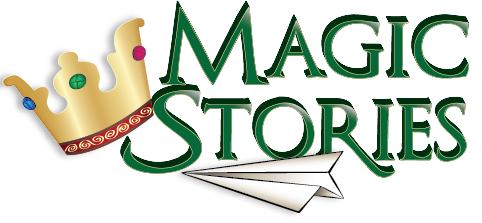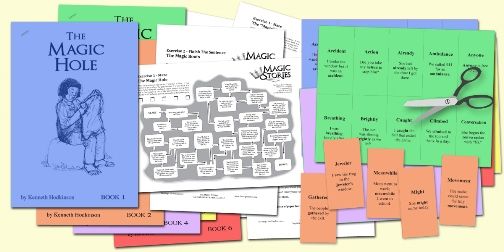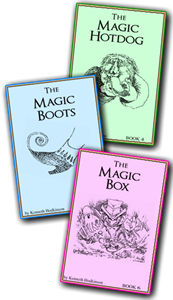Books are one of our favorite things to review. You can learn important facts about history, discover far away places, examine animals and their habitats, find out the step-by-step details of a craft, locate a tasty recipe, and plummet into a fantasy land--all through the pages of a book.
Because literature is the foundation of our education, I'm always looking for new books to add to our vast collection. The Magic Stories from Allsaid & Dunn, LLC, publishers of The Reading Game and authors of the Wordly Wise series are digital stories, so they won't even take up precious bookcase space.
Allsaid & Dunn was founded by Kenneth Hodkinson who authored the first Wordly Wise vocabulary book over 40 years ago. He expanded the series to include books for grades K-12 and is well-known for vocabulary development. He also worked with his daughter to launch The Reading Game, an interactive card matching game and accompanying books. We were first introduced to The Reading Game 6 years ago and have been playing it ever since. In fact, I had pulled it out to play with my 5-year-old just days before learning about The Magic Stories a month or so ago. Knowing how much we enjoy that game, I was excited to use this follow-up resource, as well.
The Magic Stories reading program contains a set of 6 books that are written at a 2nd-3rd grade level:
The stories are written with most words fitting into the category of simple sight words based on familiar phonetic patterns and word family association. As we all know though, the English language is tricky, and not all words can be easily learned or recognized by an early reader. That's why these stories incorporate some of those more difficult words into their texts. These words are listed as the "Naughty Forty" at the back of each book.
The program also includes printable flashcards and worksheets for each story. The flashcards correspond to the Naughty Forty words. They print 10 cards on a sheet of paper and list the word in bold along with a sentence using the word. The 4 worksheets for each story follow the same format: maze (answering true/false questions about the story; a correct answer takes the student to a new question, an incorrect answer results in a dead end), finish the sentence (answering questions about the story in own words), imagine (gives the student an opportunity to put himself in the story), finish the story (encourages the student to write a part 2 to the story and gives example beginning paragraphs).
Allsaid & Dunn was founded by Kenneth Hodkinson who authored the first Wordly Wise vocabulary book over 40 years ago. He expanded the series to include books for grades K-12 and is well-known for vocabulary development. He also worked with his daughter to launch The Reading Game, an interactive card matching game and accompanying books. We were first introduced to The Reading Game 6 years ago and have been playing it ever since. In fact, I had pulled it out to play with my 5-year-old just days before learning about The Magic Stories a month or so ago. Knowing how much we enjoy that game, I was excited to use this follow-up resource, as well.
The Magic Stories reading program contains a set of 6 books that are written at a 2nd-3rd grade level:
- The Magic Hole
- The Magic Ax
- The Magic Joke
- The Magic Hotdog
- The Magic Boots
- The Magic Box
The program also includes printable flashcards and worksheets for each story. The flashcards correspond to the Naughty Forty words. They print 10 cards on a sheet of paper and list the word in bold along with a sentence using the word. The 4 worksheets for each story follow the same format: maze (answering true/false questions about the story; a correct answer takes the student to a new question, an incorrect answer results in a dead end), finish the sentence (answering questions about the story in own words), imagine (gives the student an opportunity to put himself in the story), finish the story (encourages the student to write a part 2 to the story and gives example beginning paragraphs).
Included with the exercise worksheets are a couple record keeping pages to help you keep track of your child's progress. The word assessment sheet lists the Naughty Forty words for the book. If your student can read and understand the word, you mark a check on the line. There are spots for testing both before reading the story and after reading it. The running record page gives a 100-word excerpt from the beginning of the story. You can mark any mistakes your child makes while reading and determine their level of accuracy.
There isn't a suggested schedule or directions included with the program, so you have much liberty with how you use it. I had my second grader use The Magic Stories as part of his daily reading. The short books can be printed, but we chose to read them digitally. My son would read the Naughty Forty words to me, and then read the story to himself. Afterward, he would complete the printed maze, sometimes on his own and other times with me. Then, we would work through the exercise pages together. Instead of requiring him to write his answers, I allowed him to verbally tell me. That time together also gave us the opportunity to expou/nd on his thoughts, especially during the imagine questions.
The Magic Stories is a new program, so there are a few kinks that still need to be worked out. Things like Naughty Forty lists not matching between the list in the book and the list on the word assessment sheet, grammatical errors, and spelling mistakes are some of the issues. There also isn't an answer key, so the only way to know the correct answers is to read the stories yourself. All in all, it's a good program that will be even better when the mistakes are corrected.*
(*Edited to Add: There are now both instructions and the correct sight word assessment worksheets under the free resources section toward the bottom of the page.)
There isn't a suggested schedule or directions included with the program, so you have much liberty with how you use it. I had my second grader use The Magic Stories as part of his daily reading. The short books can be printed, but we chose to read them digitally. My son would read the Naughty Forty words to me, and then read the story to himself. Afterward, he would complete the printed maze, sometimes on his own and other times with me. Then, we would work through the exercise pages together. Instead of requiring him to write his answers, I allowed him to verbally tell me. That time together also gave us the opportunity to expou/nd on his thoughts, especially during the imagine questions.
The Magic Stories is a new program, so there are a few kinks that still need to be worked out. Things like Naughty Forty lists not matching between the list in the book and the list on the word assessment sheet, grammatical errors, and spelling mistakes are some of the issues. There also isn't an answer key, so the only way to know the correct answers is to read the stories yourself. All in all, it's a good program that will be even better when the mistakes are corrected.*
(*Edited to Add: There are now both instructions and the correct sight word assessment worksheets under the free resources section toward the bottom of the page.)
My boy enjoyed The Magic Stories and laughed at many parts. He told me, "The Magic Hotdog is my favorite, because it's so funny." He is already a strong reader and struggled with only a few words through this program, so he read through the pages quickly and nearly effortlessly.
If your emerging reader needs some practice, The Magic Stories might be a help to you.
If your emerging reader needs some practice, The Magic Stories might be a help to you.
You can connect with The Magic Stories through the Reading Game on the following social media sites:
Facebook
Twitter
Pinterst
YouTube
You can read more reviews of The Magic Stories on the Homeschool Review Crew blog.
Pinterst
YouTube
You can read more reviews of The Magic Stories on the Homeschool Review Crew blog.






